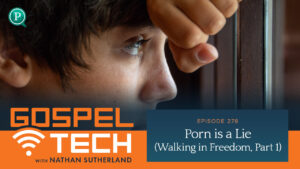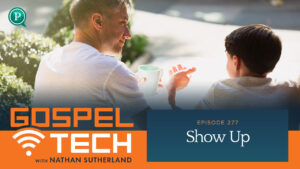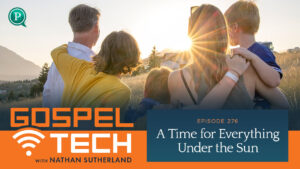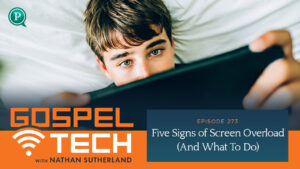Let’s make this summer amazing. We can do it on a budget, with our families, in town. You don’t have to spend a lot of money or brainpower. All it takes to make summer awesome is to be intentional with our tech, build in some fun, and practice rhythms of rest. After that you just add friends, and you’ve got yourself a party.
Transcription:
Nathan [00:00:08] Hello, everyone, and welcome to the Gospel Tech Podcast. My name is Nathan Sutherland, and this podcast is dedicated to helping families love God and use tech. Today we’re talking about how to make summer fun. I’m coming at this from the angle of summer can be fun just by default. It’s great. Some of us already have really fun ideas and trips and sports and all that, and that’s great. So wonderful if you’re already there. But if you’re someone who’s like, Hey, you know what? We’ve got some school rhythms, some survival rhythms. We were making it through. Again, I live in the Northwest, so it rained a lot this year, like up until about two weeks ago, it was 40 something and raining and then it skipped straight to 90. And sometimes we don’t know what to do with that information. We’re still in the 40 something rhythms and it looks different. When it’s raining all the time, you can do stuff outside. Sometimes you just don’t. So we’re going to talk have this conversation about what does it look like to take stock of our current situation and then assess what needs to change, What can we do? And it’s not about here’s the perfect itinerary for summer. So now go live some Instagram dream that Nathan’s going to set for you. Instead, I’m trying to make this very approachable because it’s what I’m trying to do with summer. It’s what Anna and I are trying to intentionally instill in our kids so that when summertime hits, it’s not about great, just be a different form of busy. It’s all right, what can we be intentional with, with this new opportunity, with this sunshine and this a little bit more leniency we’ve got with freedom in school and a different work schedule? So that’s what we’re talking about today, is how do we make summer fun? How can we do it within our own lives, within our own budgets, and do it in a way that’s going to glorify God and raise up our kids in the way they should go? So with no further ado, let’s get this conversation started.
Nathan [00:01:51] Welcome to the Gospel Tech podcast, a resource for parents who feel overwhelmed and outpaced as they raise healthy youth in a tech world. As an educator, parent and tech user, I want to equip parents with the tools, resources and confidence they need to raise kids who love God and use tech. Thank you to everyone who’s made this podcast possible. Thank you for listening. For sharing. For liking and for going to Gospeltech.net and clicking the donate button and supporting us financially. That’s amazing. We are part of a 501c3 nonprofit. Flint and Iron is the name of the nonprofit, and its goal is to spark purpose in youth. That is a public organization not publicly traded, but public in meaning it’s not faith specific. So I go into public schools and I give talks on hope and how to use tech on purpose, not for purpose. And then Gospel Tech is the ministry that’s specifically focused on connecting the hope of the gospel to our technology. So thank you for helping us do that work.
Nathan [00:02:55] Today’s conversation is about how do we make summer fun? How are we going to be intentional with this? And the first is we’re just going to put tech in its proper place. This is that Andy Crouch encouragement that our tech needs to wait for us. I love that reminder and the way I phrase it on using tech on purpose, not for purpose. So this summer it’s going to look like first we get tech out of the bedroom, if that’s something we’ve been holding on to or that we slipped into over the fall and into the winter and into the spring, I get it. But what can we do instead? Let’s make tech be in a public space. Let’s get our phones out of our bedroom and get a real alarm clock. Let’s get our screens, our tablets and our computers and our gaming devices. Let’s get them into public spaces so that we can make sleep normal this summer. Let’s make rest normal, and then let’s make tech use in public normal and let’s get it out of our mealtimes. Like, let’s make sure that tech is where it needs to be so that our mealtimes can be more social and more intentional. And with that, I would say with your meal times are a nice little trick that we’ve uses for conversation piece high/low works. If you want to get your kids talking about like, what do I do without my tech? And all this eye contact can be uncomfortable if you’re used to it. But another way to do it is to get something like the Hygge cards. H-Y-G-G-E. It’s a Scandinavian thing, but the idea is they’re just conversation cards. They’re not all home runs. You can flip through them and pick out ones you like, but they are fun. And for summertime it works with company, it works for strangers, it works with people you know really well. And they can just be a fun way to like, ask different questions. And with grandparents in the room, they can get really cool stories that the grandparents wouldn’t have thought to tell you. But you can like get a little bit deeper and hear things. Anna and I just had this experience be like, Oh, actually, I’ve never heard that. That’s really interesting. Like fun. So conversation cards, but conversation because tech is staying in its proper place.
Nathan [00:04:50] The second thing then is that we’re going to make sure we’re using our tech on purpose. The summer does not have to be tech free. You’re welcome to make it tech free. I would encourage you, if you’re going tech free, start with maybe a chunk of a day if you’ve never done that before, and then maybe a full day and then a couple of days, like you go on a trip with your family and you only keep a phone for emergencies, right? But none of the distraction devices come with you. Try that. But that’s not my goal in this. In talking about making summer fun again, we’re going to be talking about how do we use our tech on purpose. So first is we need to know how long we can use it or actually in time. It’s how long, how often and how much. And what I mean by that is we need to know what time of day we can use it. So we can only use tech, you know, after 10 a.m. or we can use it in this window in the afternoon. Okay. And then we know how much time of that can I do it? So as a two hour window to use the tech, but you only get an hour or 30 minutes or whatever it is. And then third and final one is how often? So maybe it’s just that one three hour window, but things like smartwatches and things like smartphones can be one that we check a lot. And so that’s where we go, Hey, like, here’s our time window and here’s how many times we can return to this tech and here’s the total amount of time we can accrue on it. And that’s just a conversation I want to make sure you have about your tech. The second is you want to know what content with the music, with the games, with the shows, with the news that they’re ingesting what’s acceptable. Let’s make sure we’ve had it. This is part of making a family tech framework. We just want to make sure we have that set up. And then third is we want to watch for fruit. Is this engagement bringing out the love and joy and peace and patience and kindness that the Lord brings out whenever we abide with Him, whenever we connect with Him? If so, that’s awesome. I want tech around kids that’s going to make them more like Jesus. But if they start to wilt, if you see your child who’s wired in a certain way and they start to just kind of go to pieces, and this one piece of tech is the only thing that really brings them happiness or purpose or desire or longing. They don’t get amazed by God’s goodness. They’re not inspired by creation, they’re not engaged in relationship. They’re not becoming more alive and vibrant and present. They’re becoming less. That’s concerning. And that’s where the conversation is, right? If it begins to bring up envy and lust and jealousy and dissension, if there’s any of those Galatians 5:21. Pieces are 19 through 21. Fruit. That’s fruit of the flesh. And we to go, All right, something’s wrong here. Let’s check the content and let’s move. Summer is a great time to replace unhealthy activities with new ones, because usually the weather is better and people are more available because of calendars and schooling. And again, weather here in the northwest, it’s hard to get people to hang out outside when it’s raining. Then we’re going to look at, all right, how do we build in the fun? So we’re going to change where our tech is and make sure that it waits for us. Then we’re going to make sure that the content and the timing is reasonable and appropriate. Now we’re going to make it fun whether or not tech is involved. And I like to just build fun into anything. Like with our kids, be like, Hey, go clean up their room. They don’t do it. But if I set a time limit or if I count a number of blocks or if I make a game out of it and it’s silly, but this is what a lot of our really amazing technology pieces do as they gamified, they put fun and challenge and natural learning inspiration into normal tasks that don’t have to necessarily be exciting. So yes, technology is good at it, but they’re good at it because they’re intentional. So Duolingo can get you to learn a language and it feels like you’re playing a game sometimes. You’re still learning, it still takes work, but there’s this gamification of it and that doesn’t have to be bad. So when you go on a walk, bring a ball, when you do a task, make it a challenge. You’re on a hike. Who can get to the top the first? Now I’m going to pause here because sometimes we over competitive, I don’t know how to say that word and we make things overly competitive when they should just be be present. So I’m not saying do this for everything. I’m saying bring it into regular life and be intentional about it. So you might be at the lake. One of my personal favorites is see who can hit the floating leaf. Right? And whether it’s flowing water or still. That’s the challenge. Maybe you have to use your off hand, maybe you have to cover an eye. But it’s the challenge. It’s a game. It’s very silly. Maybe it is reach the top of the hill. Maybe depending on your crew, it’s who can stay on the top of the hill. We had an ad hoc or excuse me, a adlib game of king of the hill happened on the beach with our family and it turned into just the nieces and nephews and a mound of sand. And we had to make some rules like you couldn’t attack people from behind, like they got super into it. But like that, that’s fun. And it’s not a requirement. That’s not something you have to do. But just keep in mind that competitive aspect, the coplay aspect, the real life in the sand, going to get dirty aspect is a wonderful opportunity this summer and sometimes our kids are just kept a little too safe. Sometimes we keep the reins a little too tight, a little dirt, a little mud, a little sand. There’s a reason we have baths and showers. There’s a reason there’s running water near most of the places we live is we want to make sure that our children have the opportunity to experience some dirt play and work and some of the cleanliness that’s going to help them be well. So keep that in mind. Build games and do it. And again, just for review, Games need some kind of vocal challenge. They need a rule set. I mentioned cover in one eye, but it can be you can’t move your feet or you can have to be moving the whole time or whatever, like some silly rule and then some way to know when you’ve won, you hit the thing, you did it three times, you did it in under a minute. Like whatever the thing is, you can make a game out of just about anything. And I love to see how creative parents are when they make games, so bring that in. But while we’re having fun and making games and that’s amazing, let’s make sure that we’re not overdoing it. So I mentioned there are times where we just want to be quiet and we just want to enjoy the beauty of the space that we’re in. That’s great. Sometimes I go on a bike ride just because I like the bike ride. I don’t have to bring all my training things right. I’ve got I can take a training plan with me on a little computer on the front of my deal, and I’ve got nothing that tells me cars are coming, and I have. I get really competitive and I’m trying to beat my other numbers. And that’s fine for, like, what gets me outside as part of being healthy. But sometimes in the summer you just want to ride and not know your speed and not know if you’re winning or losing. Like, please remember that. That is part of it.
Nathan [00:11:13] And that’s really what this fourth part of making summer fun again, this idea of building in rhythms of rest, being intentionally restful. So for our family, what that looks like is we usually have our morning time and sometimes that’s getting work done or spending time together with others. And then from 1 to 3, we have independent quiet time. You’re not going to be doing anything with the sibling even though you play really well together. I’m so proud of you. You’re not going to be doing anything digitally. This isn’t the time to take AR tests or to watch a show or to play a game. This is time to read, to nap, to sit, to write. This is time to play with Legos. Board games are fine. You’re not going to get overstimulated. And yes, my kids can play board games on their own. They’ll make up their own rules. And that’s kind of the point is allow a little bit of that boredom to seep in. Not punitive boredom, not I’m not allowing you to have fun or see people or go outside. You can go outside in this time, but you just can’t do it together. You need to have some independent time to let your mind rest, to let your heart rest. As John Mark Comer says, in the Ruthless Elimination of Hurry to let your soul catch up with your body. And sometimes summers are just frenetically paced, the sports are going, the friends are going, the summer is going. The sun is out and the events are happening and we don’t want to miss a single one of them and that’s awesome. Let’s build in a rhythm now of letting a self just kind of breathe and it might be painful. Your family 2 hours. That might have been ridiculous when I meant it that. This is something we’ve done for years. Anna is really, really good at building in rhythms of rest. Maybe start with 15 minutes? 15 minutes independent, sit, read, nap, make yourself some space and then maybe add 5 minutes every few days and you get up to 30 minutes and you hold that for a week or two and maybe that’s fine. Maybe all your family needs this 30 minutes. Great. But whatever it is, make some space to just be intentionally quiet. And as adults, let’s join them in that. Let’s not just fill the void with activities and projects and being busy like let’s practice some of this, being present and being present specifically with our tension and our quiet.
Nathan [00:13:22] And then finally, the last thing we can do to make summer fun, at least in this conversation, is include other people. Let’s make it social. Let’s take this opportunity to invite people into our lives, invite them into our homes, or at least our driveways or our yards and absolutely do a cookout or a barbecue. Absolutely play some games. But with our family, we do the kind of morning activity. We have our quiet time, and then the afternoons where we see people and this is where we capitalize on the fact that it’s summer. So we’re going to play some basketball, we’re going to go on the trampoline, kids are going to run through the sprinklers, they’re going to play some tag, they’re going to pause. We’re going to have some popsicles. It doesn’t have to be fancy again. Don’t break the bank. But your local Walmart can give you otter pops. Six bucks will get you 80 of them. So that’s enough to share at something cool to eat. And then you can go back to your fun and have your good times and then next activities, right? They’re going to maybe go play some baseball in the cul de sac or in the in the field next door. Our kids always throw on some Calvin ball. They read a lot of Calvin and Hobbes. And so they’ve kind of had this idea of like, it’s baseball, but there’s melee combat involved. You don’t have to do that, but let them make up their own games and rules. It’s important for social learning that co play of kids where they play house and they start making roles and telling other people the rules that are happening in real time, it’s actually really important. That’s a wonderful part of brain development. It’s how they learn the social norms of communication and how they learn to deal with conflict. Let them do that. Let them have something that doesn’t have the all of the rules pre-scripted, again, really fun and things like video games. And that can be very valuable, but it’s also super important for emotional and personal development to be a part of just free play.
Nathan [00:15:03] And then as the evening cools off, throw on a sweatshirt and keep the fun going, maybe play laser tag or regular tag for that matter. Maybe play flashlight tag or kick the can and then have a fire. Just put some rocks in a circle or go to your local Lowe’s or Home Depot, get some small retaining rocks. You get 36 of them for like 70 bucks. Stack them in a circle. You get a very nice looking firepit and then have some s’mores or include some social tech. Maybe you’re going to show a movie together projected on the side of your house or on a sheet, maybe watch it on a laptop, whatever your speed is. And then at the end of the evening. We’ve got kiddos who have been around others. They’ve used tech intentionally, they’ve enjoyed the outdoors, they’ve learned to be quiet and calm. And at this point in the day they’re probably just little sacks of potatoes that you’re going to be plopping into bed and they’re going to be sleeping for whatever length your kiddos sleep. I found that being tired at night doesn’t mean that my kids are going to sleep a long time, but that they’re going to get after it again the next day. And that idea for this rhythm of summer is that we’re keeping tech in its proper place and then using it on purpose. We’re not avoiding it altogether, but we’re not just letting it seep into all aspects of our lives. We’re going to build in fun to kind of take back this idea that games are part of life before there was ever screens, right? Gamification wasn’t an idea of behavioral designers and user interface designers in games. It’s behavioral psychology. It’s how we learn and work. So make everything fun and make it a game. And let’s convince ourselves that real life is fun. And even sometimes things that take work are fun. Type 2 fun’s incredibly rewarding and it’s really important for us. Then let’s make space for rest and let’s include people in our summer. Because at the end of the day, what we’re doing here is we’re building community. We’re modeling for our kids, what a healthy life looks like, and we’re not distracting ourselves from the work of the Lord. We’re instead making ourselves available for the work of the Lord because we have the space, we have the bandwidth, we have the social ability to both engage and to know our neighbors. And yeah, when the Lord throws you a curve ball, this isn’t your daily itinerary. This is some of the things you can add to what you’ve already got. You’ve got a full plate, but maybe these five things will make you look at your life, say, Hey, you know what? I’ve got a full plate. But some of it might not be the best. Maybe this thing needs to go away or get some distance for now, and we need to add something else instead.
Nathan [00:17:32] And that’s my hope for you, is that in making summer fun, you’re making it fit your family, your season of life, and you’re making an intentional so that the fun isn’t just distraction. The fun is actually showing us who God’s made us to be and how great and amazing God is. So I hope this is encouraging. Please share it with people. If it was so that they can hear some of these ideas as well and learn how to love God and use tech. And I hope you’ll join me next time so we can continue this conversation about how we can love God and use tech.
Follow this podcast:







